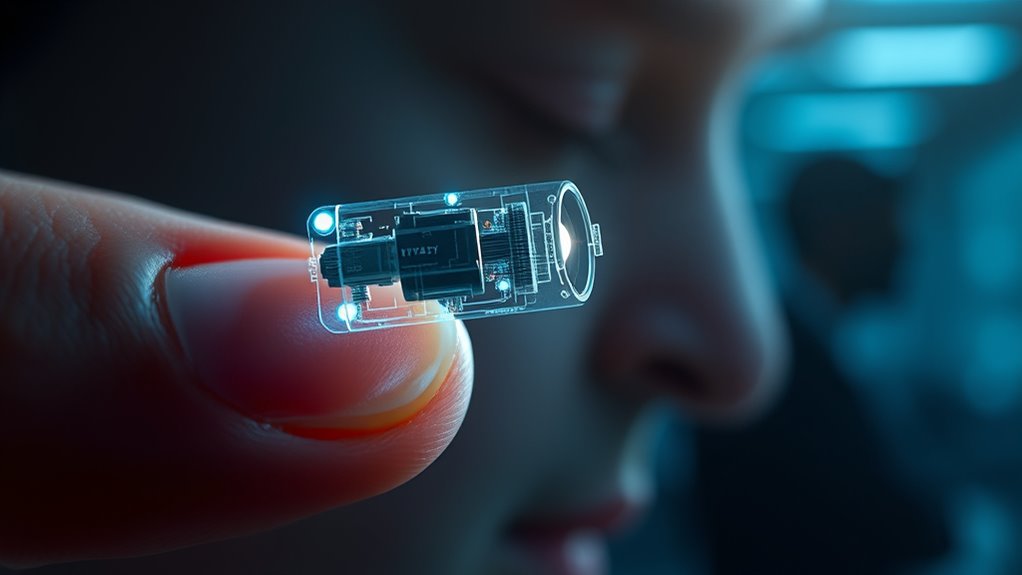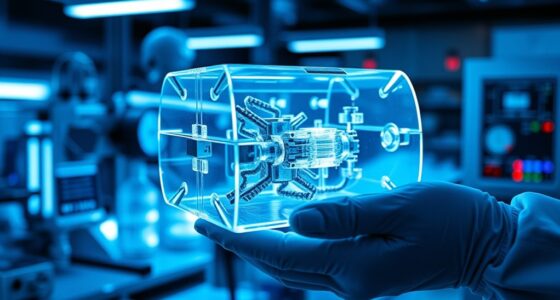Nanomachines can gather personal data silently, raising serious privacy concerns, especially if used covertly for surveillance or data collection without your knowledge. They also pose security risks, as malicious actors could hijack or weaponize them for cyberattacks or sabotage. Respecting your autonomy means having control over their activation and data sharing. Responsible development requires strong regulations and ethical guidelines to protect your rights, and understanding these issues better can help you stay informed and prepared.
Key Takeaways
- Nanomachines can covertly collect personal data, raising significant privacy concerns and risks of unauthorized surveillance.
- Ensuring informed consent is essential to respect individual autonomy over nanomachine activation and data sharing.
- The potential malicious use of nanomachines for hacking, espionage, or weaponization poses serious security threats.
- Developing transparent regulations and policies helps balance innovation with safety and ethical considerations.
- Public engagement and education are vital for building trust and addressing societal concerns about nanotech privacy and security.
Understanding the Capabilities and Limitations of Nanomachines

Nanomachines, tiny devices operating at the molecular level, have the potential to revolutionize medicine, manufacturing, and environmental science. You should understand that these machines can perform precise tasks, like targeting cancer cells or assembling materials atom by atom. However, their capabilities are still limited by current technology; they often require specific conditions to function effectively and may not yet be reliable for widespread use. Additionally, nanomachines face challenges such as stability, control, and potential toxicity. While they can revolutionize many fields, you must recognize that their design and deployment are carefully constrained by technical and safety considerations. Fully understanding these capabilities and boundaries helps you appreciate both the promise and the risks involved in developing nanotechnology. Understanding the limitations of current technology is essential for responsible progress in this field.
Privacy Concerns in the Age of Miniaturized Technology
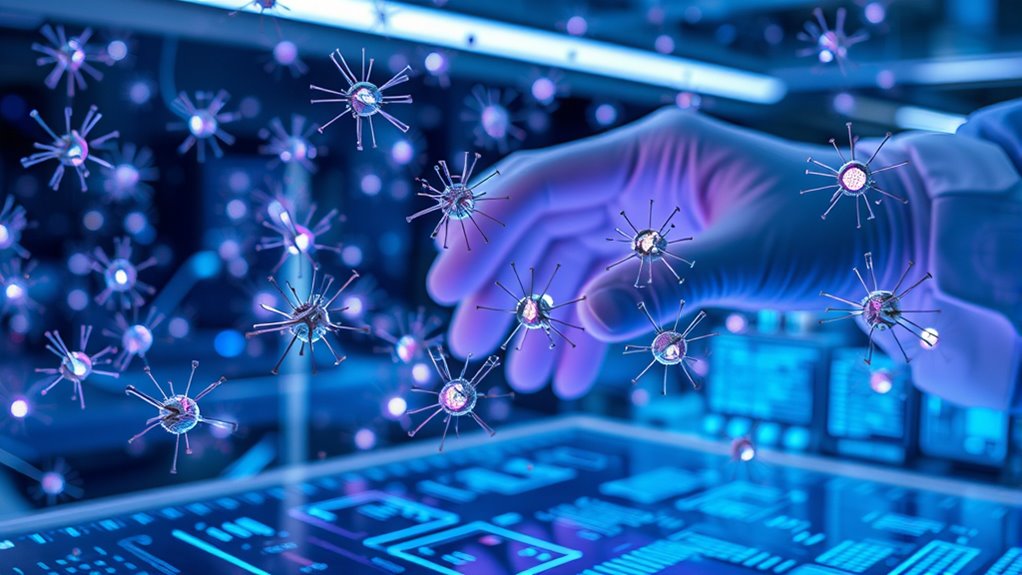
As nanomachines become more prevalent, you face increased risks of data collection and unauthorized surveillance. These tiny devices can easily gather personal information without your knowledge, raising serious privacy concerns. Protecting your data security is more critical than ever as technology advances. Understanding paint sprayer efficiency and the technology behind these devices can help you make informed decisions about their use and potential risks.
Data Collection Risks
Have you ever considered how tiny machines could secretly gather your personal information? Nanomachines can be designed to collect data from your body or environment without your knowledge. They might log your movements, health metrics, or even sensitive conversations. This silent data collection poses serious risks if the information gets into the wrong hands, leading to identity theft or unauthorized profiling. Unlike traditional data collection, nanomachines can operate covertly and continuously, making it difficult to detect or stop. You could unknowingly become a subject of ongoing surveillance, with your personal details exploited for commercial or malicious purposes. This raises critical ethical questions about how data is gathered, stored, and used, demanding strict oversight and clear boundaries to protect individual privacy. Additionally, the calibration of nanomachines is essential to ensure accurate data collection and prevent misinterpretation or misuse of the information gathered.
Unauthorized Surveillance Potential
The tiny size of nanomachines allows them to slip unnoticed into environments, making unauthorized surveillance easier than ever. They can monitor conversations, track movements, and gather sensitive information without detection. This capability raises serious privacy concerns, as individuals lose control over their personal spaces. Imagine nanomachines hidden in a room, silently collecting data. Here’s a visual:
| Setting | Nanomachine Function | Potential Data Collected |
|---|---|---|
| Office | Listen to meetings | Confidential strategies |
| Home | Track movements | Personal routines |
| Public Spaces | Record conversations | Private discussions |
With such capabilities, misuse becomes a real threat, compromising privacy without consent or awareness. The threat of covert surveillance underscores the importance of developing ethical boundaries for nanotech use. Additionally, understanding the offensive security techniques used by malicious actors helps highlight the need for safeguards against such covert intrusions.
Personal Data Security
With nanomachines capable of collecting vast amounts of personal data, your privacy faces unprecedented risks. These tiny devices can monitor your health, location, and daily activities in real-time, often without your knowledge. As data accumulates, the chances of breaches or misuse increase, threatening your confidentiality. If security measures aren’t robust, hackers could access sensitive information or manipulate nanomachines to cause harm. You might also face targeted profiling or discrimination based on your data. Protecting your personal information requires stringent security protocols and clear regulations. Without proper oversight, your details could be exploited, compromising your autonomy and trust. As nanotechnology advances, staying vigilant about data security becomes essential to preserve your privacy and prevent malicious interference. Transparency and privacy protection measures are vital to ensure responsible development and deployment of nanomachines.
Security Risks Associated With Nanomachine Deployment
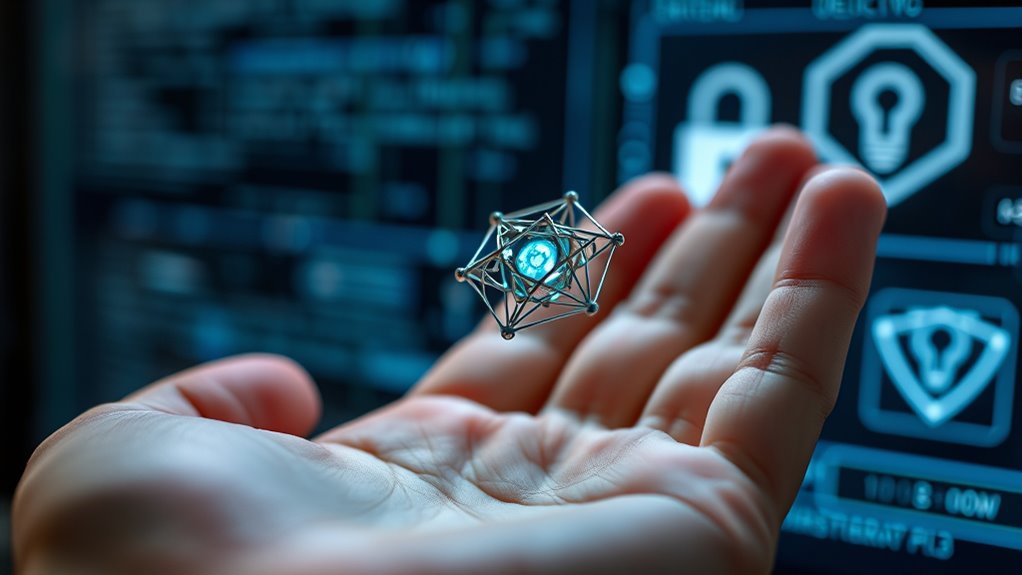
As nanomachines become more prevalent, the security risks they pose grow increasingly significant. If not properly safeguarded, malicious actors could hijack or manipulate these tiny devices, causing harm or stealing sensitive information. Because nanomachines can operate internally, they might be used to infiltrate critical infrastructure, such as power grids or healthcare systems, with devastating effects. You also face risks of unauthorized surveillance if nanomachines are weaponized for spying. Once deployed, controlling or disabling compromised nanomachines becomes a complex challenge, especially if they can replicate or adapt. Without robust security measures, nanomachines could become tools for cyberattacks or physical sabotage, amplifying existing vulnerabilities in various sectors and threatening your safety and privacy. Additionally, the potential for cybersecurity vulnerabilities during deployment underscores the importance of implementing security protocols to prevent malicious exploits.
Informed Consent and Personal Autonomy in Nanotechnology Use

Security vulnerabilities in nanomachine deployment highlight the importance of respecting your rights and choices. You need to be fully informed about how nanomachines will interact with your body and data. Consent isn’t just a formality; it’s essential to maintain your personal autonomy. Without clear understanding and agreement, you risk losing control over your body and privacy. The following table summarizes key aspects:
| Aspect | Consideration | Your Role |
|---|---|---|
| Informed Consent | Understand risks and intended use | Ask questions, review info |
| Personal Autonomy | Control over nanomachine activation | Make voluntary decisions |
| Data Privacy | Who accesses and manages your data | Stay aware and assert boundaries |
Ensuring you’re truly informed helps protect your autonomy and prevents misuse.
A thorough understanding of nanomachine technology is crucial to safeguarding your rights in this evolving field.
Potential for Misuse and Malicious Applications

Nanomachines hold incredible potential for medical and technological advances, but they also pose significant risks if misused or weaponized. You need to be aware of how malicious actors might exploit this technology.
Nanomachines offer great promise but also pose serious risks if exploited maliciously.
- Unauthorized Surveillance: Nanomachines could be used to secretly monitor individuals without consent, invading privacy.
- Bioweapons Development: They could be weaponized to target specific populations or biological systems, causing harm.
- Data Manipulation: Malicious use might involve hacking into systems to steal or alter sensitive information.
- Cyber-Physical Attacks: Nanomachines could disrupt critical infrastructure, leading to widespread damage or chaos.
- Power and Performance Capabilities: As technology advances, the power output of nanomachines could be intentionally increased to enhance their effectiveness in malicious applications.
Understanding these risks helps you grasp the importance of safeguarding nanotech from malicious applications. It’s vital to develop protective measures now.
Regulatory Challenges and Policy Development

Addressing the risks associated with malicious uses of nanomachines requires establishing effective regulations and policies. You’ll need to develop frameworks that keep pace with rapid technological advances while preventing misuse. Balancing innovation with safety is vital; overly strict rules could stifle progress, while lax policies increase vulnerability. International cooperation becomes essential, as nanomachines can cross borders easily. You must also consider enforcement mechanisms, ensuring compliance without infringing on privacy or civil liberties. Policymakers face the challenge of creating adaptable laws that can evolve with the technology. Transparency in regulation helps build public trust, but it must be balanced against national security concerns. Considering environmental considerations is also crucial to prevent ecological harm from nanomachine misuse. Ultimately, your goal is to craft policies that foster innovation responsibly while safeguarding society from potential harm.
Ethical Frameworks for Responsible Innovation
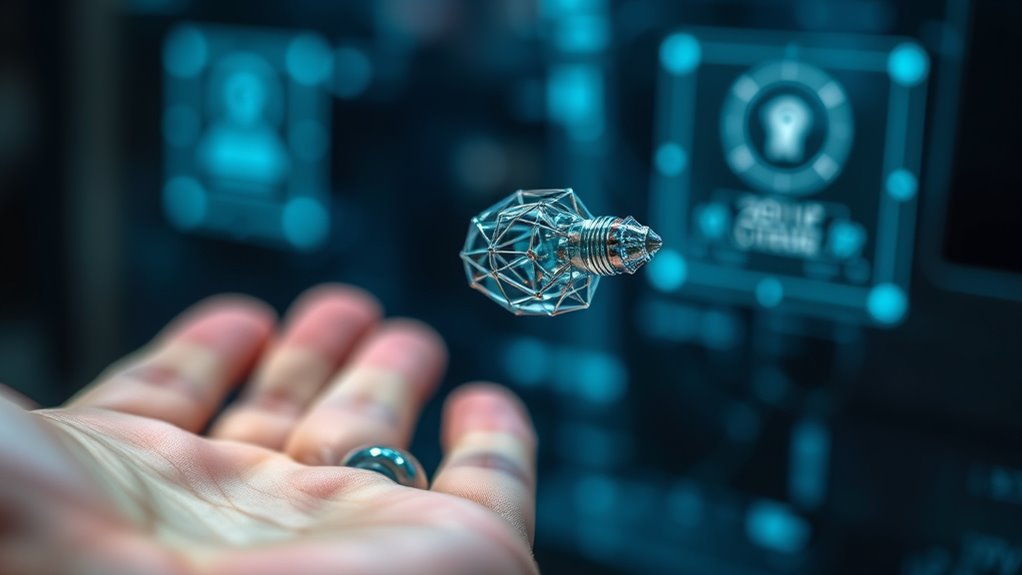
As you explore responsible innovation, you need to find ways to balance technological advancement with ethical considerations. Developing clear regulatory standards helps guarantee nanomachines are used safely and ethically. By aligning innovation with ethical frameworks, you can foster trust and accountability in this emerging field. Additionally, understanding the design principles of a farmhouse bedroom can serve as a metaphor for creating ethical guidelines—both require careful planning and a harmonious balance of elements.
Balancing Innovation and Ethics
Balancing innovation with ethical responsibility is essential as nanomachines become more advanced and widespread. You need to develop frameworks that promote progress without compromising core values. First, establish clear ethical guidelines that prioritize human rights and safety. Second, incorporate stakeholder input to ensure diverse perspectives shape development. Third, implement ongoing monitoring to identify and address unforeseen ethical issues early. Fourth, foster transparency in research and deployment, building public trust and accountability. By following these steps, you can support responsible innovation that advances technology while respecting societal norms and individual rights. This balance ensures nanomachines serve humanity’s best interests without crossing ethical boundaries. Ultimately, responsible innovation guides technological progress in a way that benefits everyone without sacrificing morals.
Developing Regulatory Standards
Creating effective regulatory standards is essential to guiding responsible innovation in nanomachines. You need clear rules that address safety, privacy, and ethical concerns, ensuring technology benefits society without causing harm. Developing these standards involves collaboration among scientists, policymakers, and ethicists to establish benchmarks for design, deployment, and oversight. You should focus on transparency and accountability, making sure innovators follow best practices and disclose risks. Regulations must be flexible enough to adapt to rapid technological advances while maintaining public trust. By setting ethical frameworks, you help prevent misuse or unintended consequences. Ultimately, creating robust standards ensures nanomachines develop responsibly, balancing innovation’s promise with the need to protect individual rights and societal values.
Fostering Public Engagement and Trust in Nanotech Advances

How can we guarantee the public feels confident and informed about nanotechnology? Building trust requires proactive engagement. First, you should prioritize transparent communication by sharing clear, accessible information about nanotech benefits and risks. Second, involve communities in discussions and decision-making processes to foster a sense of ownership. Third, support education initiatives that demystify nanomachines, making complex topics understandable. Fourth, establish open channels for feedback and concerns, showing your commitment to addressing public worries. By doing these, you create a foundation of trust and understanding. When people feel included and well-informed, they’re more likely to support advancements ethically and responsibly, ensuring nanotechnology benefits everyone safely.
Frequently Asked Questions
How Can Nanomachines Impact Human Identity and Self-Perception?
Nanomachines can profoundly influence your identity and self-perception by altering how you experience your body and mind. You might feel more connected to technology, blurring the line between human and machine. This could boost your confidence or make you question what makes you truly yourself. As you adapt to these changes, your sense of autonomy and authenticity might shift, prompting deep reflections on who you are and how you see yourself.
What Are the Environmental Consequences of Widespread Nanomachine Deployment?
Like Pandora’s box, widespread nanomachine deployment could release unforeseen environmental issues. You might face contamination of ecosystems, as nanomachines could accumulate or interact unpredictably with wildlife and soil. There’s also the risk of disrupting natural cycles or causing toxic byproducts. You need careful regulation and monitoring to prevent long-term damage, ensuring that these tiny tech marvels don’t turn into environmental villains.
Could Nanomachines Be Used for Mass Surveillance Without Consent?
Yes, nanomachines could be used for mass surveillance without your consent. They can be designed to monitor your activities, gather personal data, and transmit it secretly. If deployed without proper regulation or transparency, they pose serious privacy risks. You might not even realize you’re being watched, making it essential to establish strict ethical guidelines and oversight to prevent misuse and protect individual privacy rights.
How Do Cultural Differences Influence Nanotechnology Ethical Standards?
You should recognize that cultural differences shape how societies perceive nanotechnology ethics. In some cultures, collective well-being takes precedence, leading to more acceptance of nanotech uses for public good. Others prioritize individual rights, demanding stricter consent and privacy protections. Your awareness of these variations helps you navigate ethical debates more thoughtfully, respecting diverse values and fostering responsible development of nanomachines across different cultural contexts.
What Strategies Ensure Equitable Access to Nanomedicine Advancements?
You can guarantee equitable access to nanomedicine by pushing for policies that prioritize affordability and distribution. Advocate for global collaborations that share technology freely, and support initiatives that target underserved communities. Don’t rely on market forces alone; actively promote subsidies and regulatory frameworks that prevent monopolies. By doing so, you help turn nanomedicine from a luxury for the few into a universal tool for health.
Conclusion
As you navigate the rapid growth of nanomachines, remember that over 70% of adults express concerns about privacy and security in emerging technologies. It’s essential to advocate for robust regulations and ethical standards that protect personal autonomy and prevent misuse. By staying informed and engaged, you can help shape responsible innovation, ensuring nanotechnology benefits society without compromising ethical principles. Your vigilance and input are key to fostering trust and safeguarding our future.
